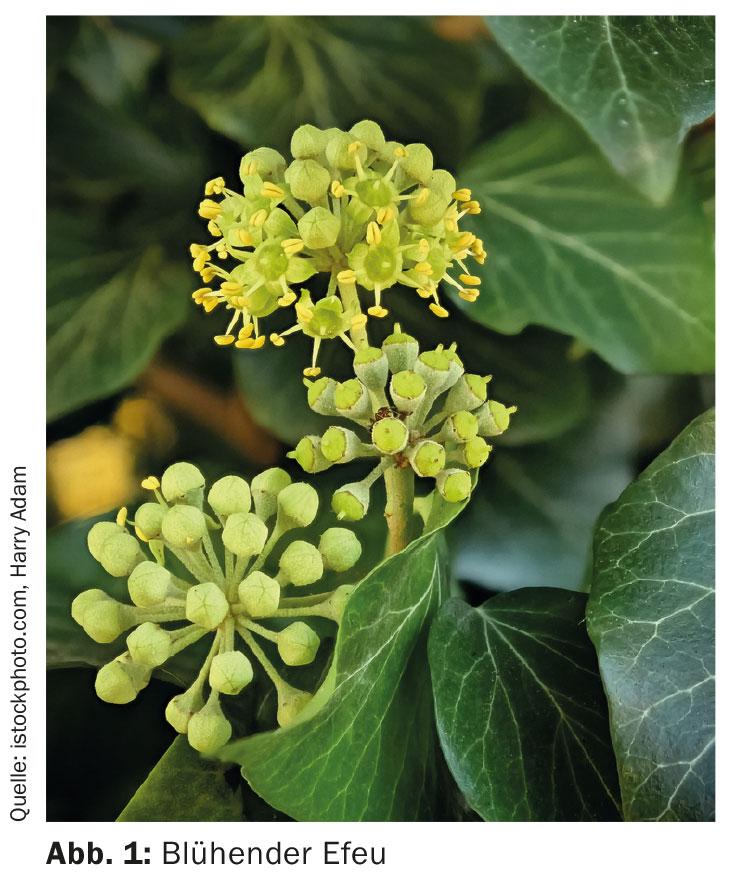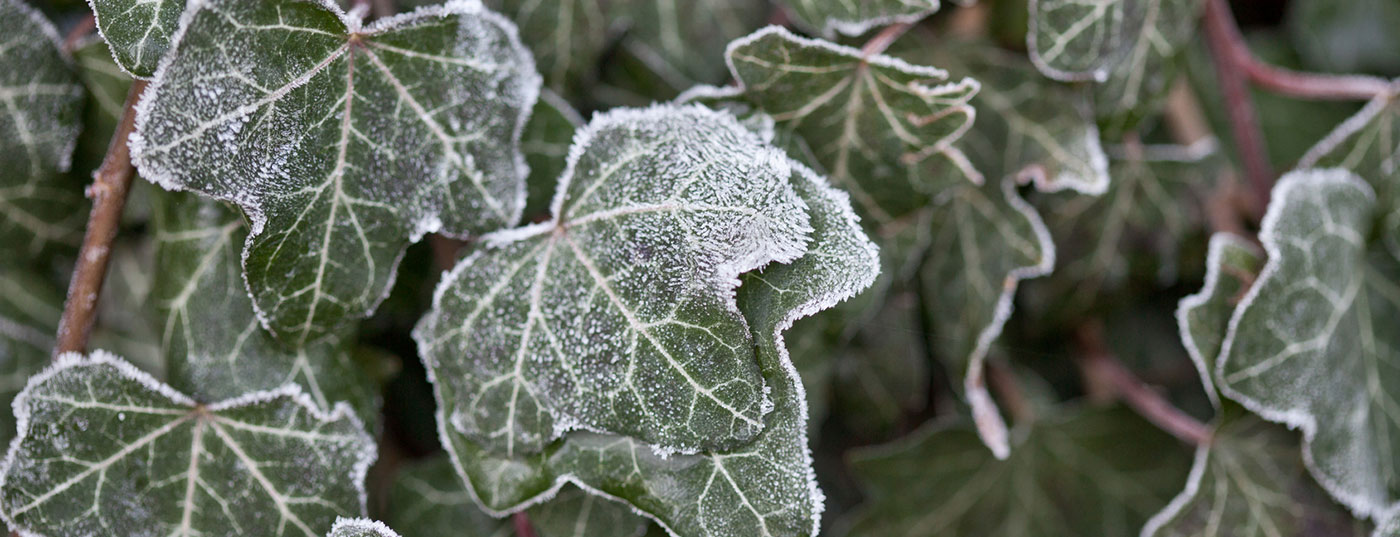Extracts from ivy leaves have been used in folk medicine for centuries. They have secretolytic, bronchospasmolytic and antiphlogistic effects. What is the value of ivy extract today?
The ivy, Hedera helix L. from the Aralia family, is an evergreen plant with characteristic leaves that is widespread in Europe (Fig. 1). Every child knows ivy because it grows spirally up trees as a climbing plant. It can also spread creeping on the ground and cover entire areas. But as soon as it reaches a tree, it climbs up it.

Ingredients and effect
In addition to caffeic acid derivatives, flavonoids and polyacetylenes, triterpene saponins are found in Hedera helix, for example the glycoside hederacoside C, whose aglycone is α-hederin. In folk medicine, ivy has been used for centuries, including as a poultice for nerve pain. And in the “Contrafayt Kreuterbuch” by Otto Brunsfeld is even reported contraceptive and abortifacient properties [1]. Extracts of ivy leaves have secretolytic, bronchospasmolytic and antiphlogistic effects. Clinically, they are used against acute and chronic bronchitis and against obstructive airway diseases. For this purpose, mainly ethanolic extracts are produced. Most of the clinical studies were conducted with the ivy extract EA 575® (Tab. 1).

Clinical studies with the ivy extract EA 575®.
The effectiveness of ivy extract EA 575® against various respiratory diseases has been proven in numerous studies. On the one hand, these are controlled clinical studies, on the other hand, they are observational studies carried out in adults, but also in children with corresponding symptoms. In the following, a selection of such studies will be presented, as a comprehensive overview would exceed the scope of this presentation.
Acute cough: In 2016, Schäfer et al. published. [2] a randomized, double-blind, placebo-controlled, multicenter study evaluating the efficacy and safety of ivy extract EA 575® versus placebo in adults with acute cough. For this purpose, 181 adults suffering from an acute cough were treated three times a day for one week with either EA 575® or placebo. The primary efficacy parameter was cough severity, which was assessed with a visual analog scale on days 1, 2, 3, 4, and 5. Cough severity related to the whole observation period (day 1 to 6) was used as a secondary efficacy parameter, as well as Bronchitis Severity Score (BSS) and Verbal Category Descriptive (VCD).
Compared to the placebo group, the EA 575® treated group showed a significantly better and clinically relevant reduction in cough severity and bronchitis severity score. Further, there was a detectable early efficacy within 48 hours after initiation of therapy. At all visits and until seven days after the end of treatment, this significance persisted. All adverse events documented during this study were not significant, i.e., mild or moderate, and were not related to the study drug.
This study demonstrates the superiority of EA 575® ivy extract over placebo and the efficacy and safety of EA 575® for the treatment of acute cough.
Children with asthma: Ivy extract EA 575® has not been evaluated exclusively in relation to cough and not only in adults. Its effectiveness as an adjunct therapy has also been confirmed in children suffering from asthma. This is the result of a study published in 2014, which was conducted by a group of researchers at the Technical University of Dresden [3]. Maximum expiratory flow (MEF 75-25, MEF 25) improved significantly compared with placebo after four weeks of treatment (p<0.05; p=0.044). This was seen in 30 children aged six to eleven years, all of whom had mild persistent asthma that was present despite long-term treatment with 400 mcg of budesonide. After a four-week run-in period, the 30 children were randomized either to the placebo group, which received placebo in addition to corticosteriod treatment, or to the verum group, in which 5 ml of EA 575® syrup was administered twice daily in addition to conservative treatment.
This study shows that children with mild persistent asthma may benefit from the additional administration of ivy extract EA 575®.
Application observations
Observational studies of use do not enjoy the same prestige in the hierarchy of medical studies as clinical, randomized, double-blind comparative studies because of the lack of blinding and the control arms (placebo or comparative treatment). Their results are often described as not really evident. Nevertheless, observational studies are highly valued by many physicians. This is because, unlike clinical trials, they are often conducted under real-world conditions, which is not the case with clinical trials.
Efficacy and safety: An observational study investigated the efficacy and safety of ivy extract EA 575® under real-life conditions. This was a postmarketing surveillance study (PMSS) that included 9657 patients (including 5181 children) [4]. These all suffered from acute or chronic inflammatory bronchitis. They were treated for seven days with a syrup whose active ingredient was EA 575®. At the end of the treatment, 95% of the patients reported that the symptoms of the disease had improved or even a complete cure had occurred. The safety of the study drug proved to be very good with an incidence of mild adverse events of only 2.1%.
No further therapeutic benefit was observed in patients who received additional treatment with other drugs. The relative risk for the occurrence of adverse events increased to 26% for this.
Safety: Another observational study, the results of which were presented in 2011 [5], documented the good tolerability of ivy extract EA 575®. 330 patients diagnosed with a common cold along with cough or chronic inflammatory bronchial disease were interviewed in the form of a PMSS using a questionnaire. In this context, 96.4% of these patients reported tolerating the drug well to very well. Among the treating physicians, as many as 98.5% answered the question about tolerability with good to very good. Thus, this application observation underpins the very good tolerability and safety of EA 575®.
Summary
Ivy extract EA 575® has been reviewed in various clinical studies and observational studies and was found to be effective in adults and children for the treatment of respiratory diseases such as acute or chronic cough, bronchitis as well as asthma. In the case of asthma, EA 575® can be used as an add-on therapy to conventional treatment methods to achieve an additional improvement in lung parameters. Thus, the ivy extract EA 575® proves to be an effective, natural and safe way of treating cough and bronchitis and a recommendable additional treatment for asthma.
Literature:
- Brunfels O: Herbarum vivae eicones. German: Contrafayt Kreuterbuch. Strasbourg 1532, reprint Munich 1964.
- Schäfer A, et al: A randomized, controlled, double-blind, multi-center trial to evaluate the efficacy and safety of a liquid containing ivy leaves dry extract (EA 575®) vs. placebo in the treatment of adults with acute cough. Pharmacy 2016; 71(9): 504-509.
- Zeil S, Schwanebeck U, Vogelberg C: Tolerance and effect of an add-on treatment with a cough medicine containing ivy leaves dry extract on lung function in children with bronchial asthma. Phytomedicine. 2014; 21(10): 1216-1220.
- Fazio S, et al: Tolerance, safety and efficacy of Hedera helix extract in inflammatory bronchial diseases under clinical practice conditions: a prospective, open, multicentre postmarketing study in 9657 patients. Phytomedicine 2009; 16(1): 17-24.
- Stauss-Grabo M, et al.: Observational study on the tolerability and safety of film-coated tablets containing ivy extract (Prospan® Cough Tablets) in the treatment of colds accompanied by coughing. Phytomedicine 2011; 18(6): 433-436.
HAUSARZT PRAXIS 2018; 13(12): 3-4











